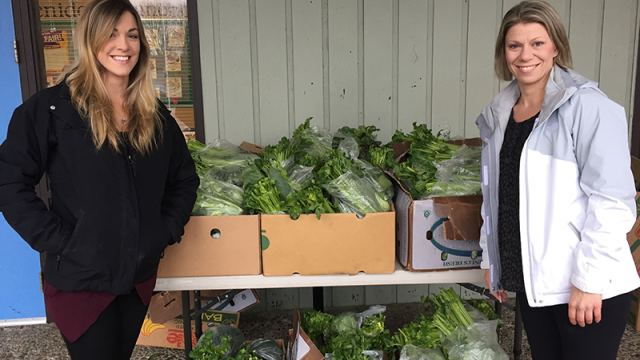Feeding academic success at Danebo Elementary
Imagine going home to an empty refrigerator at night. Doing homework with a rumbling belly. Focusing on schoolwork Monday morning after a long, hungry weekend.
It’s a reality for many of our students. Oregon has one of the highest child hunger rates in the nation. One in six households struggle to get enough nutritious food, and one in four kids goes to school hungry. In Lane County alone, more than half of students qualify for free or reduced lunches.
At Danebo Elementary, where 79 percent of students are economically disadvantaged, all kids eat breakfast and lunch for free at school. But for many, good nutrition ends when the final bell rings. Food, when it’s available, is often high in fat, salt and empty calories.
“In many cases, these children and their families may not have access to fruits and vegetables,” says OCCU Branch Manager Sara Palluck.
To help fill the void, employees from OCCU’s Barger and West 11th branches stop by the school once a week to spend an hour bagging fruits and vegetables for the school’s nearly 300 students to take home to their families. The produce, donated by a local farmer’s market, helps ensure that kids continue receiving the nutrition they need even after school hours.
“The fruits and veggies are in boxes but haven’t been sorted—sometimes there is some rotten produce that needs to be thrown away—and it made it difficult for students to take it home at the end of the day,” says school counselor Amy Tuski. “Two OCCU volunteers come over every Tuesday morning before the branch opens and they help sort and bag the fruits and veggies so that they’re easy for students to pick up and take home with them to share with their families after school.”
How fruits and veggies feed learning
Decades of research have shown us how important food is for learning. It gives kids the energy and focus they need to absorb and understand new information. But just eating food doesn’t necessarily mean they’re getting enough nutrition.
Many students who are economically disadvantaged specifically lack access to fresh fruits and vegetables, which are critical for healthy brain development. Even kids who get enough to eat can become malnourished if they’re not getting plenty of fresh produce. Fruits and vegetables provide key nutrients that are essential to the learning process. Consider:
- Nutritional deficiencies inhibit cognitive abilities and mental concentration. Improving nutrient intake can improve perception, intuition and reasoning while directly influencing intelligence levels in school-age children.
- Malnutrition can cause long-term neural issues in the brain that influence emotional responses, stress reactions, learning disabilities and other complications. It can also lead to delays in vision, fine motor skills, language and social skills.
- Students who eat enough fruit, vegetables, protein and fiber perform better on literacy tests than those who eat empty foods high in salt and saturated fat.
Helping local children thrive
Childhood hunger has increased in recent years, and people are often shocked to discover the extent of the problem within their own communities. For employees at OCCU, working with Danebo Elementary over the past three years has been eye opening.
“Children hold a soft place in many hearts, and the idea that some may not have the chance to have access to fresh produce is an awakening experience,” Palluck says. “Through the years I have also heard many personal stories from staff about how their family benefited from or would have benefited from a program like this at their school.”
It’s also been a great reminder of just how much a handful of people can accomplish.
“A few hours of our time each month can go a long way toward making a difference in others’ lives,” she says.

